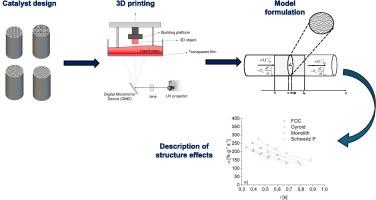DLP 3D printing of alumina catalyst architectures: Design, kinetics and modeling of structure effects on catalyst performance
IF 13.3
1区 工程技术
Q1 ENGINEERING, CHEMICAL
引用次数: 0
Abstract
The impact of the 3D structural design on the catalytic performance was investigated in this work. Four catalyst architectures (squared honeycomb, Schwartz P, face centered cubic and gyroid), made of alumina, were designed and printed with the Digital Light Processing (DLP) printing technology. The obtained shaped catalysts were loaded in a tubular reactor and their activities were evaluated in continuous ethanol dehydration to diethyl ether. The kinetic experiments revealed that both the conversion per unit of the reactor volume and the specific activity were highly affected by the selected design of the catalyst geometry. An advanced 1-D heterogeneous mathematical model employing geometrical features of the catalyst structures was proposed to describe the experimental data. The model included local variations of contact perimeters and cross-section areas to describe the periodic architectures. The assumption of plug flow pattern in the catalyst channels was revealed to be inadequate in predicting the structure effects, thus axial dispersion effects were included to obtain a successful and statistically significant description of the experimental observations. The proposed approach forms a solid basis to describe chemical processes operated with 3D printed catalyst structures

氧化铝催化剂结构的 DLP 3D 打印:结构对催化剂性能影响的设计、动力学和建模
这项工作研究了三维结构设计对催化性能的影响。采用数字光处理(DLP)打印技术设计并打印了四种氧化铝催化剂结构(方形蜂窝、Schwartz P、面心立方和陀螺)。将获得的异型催化剂装入管式反应器,并在乙醇脱水成二乙醚的连续反应中对其活性进行了评估。动力学实验表明,单位反应器容积的转化率和比活性都受到所选催化剂几何形状设计的很大影响。研究人员提出了一种先进的一维异质数学模型,利用催化剂结构的几何特征来描述实验数据。该模型包括接触周长和横截面积的局部变化,以描述周期性结构。研究发现,催化剂通道中堵塞流动模式的假设不足以预测结构效应,因此将轴向分散效应纳入其中,从而成功地对实验观测结果进行了统计意义上的描述。所提出的方法为描述使用三维打印催化剂结构的化学过程奠定了坚实的基础。
本文章由计算机程序翻译,如有差异,请以英文原文为准。
求助全文
约1分钟内获得全文
求助全文
来源期刊

Chemical Engineering Journal
工程技术-工程:化工
CiteScore
21.70
自引率
9.30%
发文量
6781
审稿时长
2.4 months
期刊介绍:
The Chemical Engineering Journal is an international research journal that invites contributions of original and novel fundamental research. It aims to provide an international platform for presenting original fundamental research, interpretative reviews, and discussions on new developments in chemical engineering. The journal welcomes papers that describe novel theory and its practical application, as well as those that demonstrate the transfer of techniques from other disciplines. It also welcomes reports on carefully conducted experimental work that is soundly interpreted. The main focus of the journal is on original and rigorous research results that have broad significance. The Catalysis section within the Chemical Engineering Journal focuses specifically on Experimental and Theoretical studies in the fields of heterogeneous catalysis, molecular catalysis, and biocatalysis. These studies have industrial impact on various sectors such as chemicals, energy, materials, foods, healthcare, and environmental protection.
 求助内容:
求助内容: 应助结果提醒方式:
应助结果提醒方式:


